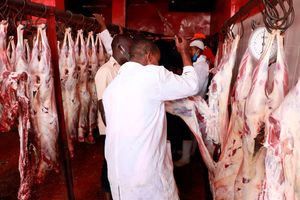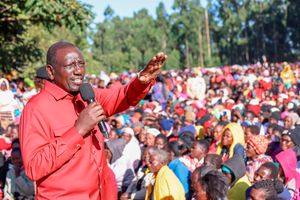
Goods on display at a supermarket in Nyeri on November 22, 2023.
Kenyans are headed to a more expensive Christmas than last year’s, with rise in prices of basic commodities.
An analysis by the Kenya National Bureau of Statistics (KNBS) showed that prices nine out of 12 basic commodities have gone up, raising the budget on households this year.
Prices of beef, chicken, goat meat, wheat flour, cooking oil, sugar, milk, potatoes, onions, tomatoes,and cabbage have all risen over the past year, the KNBS analysis has shown.
According to Dr Samuel Nyandemo, a senior lecturer of economics at the University of Nairobi, the situation is made even worse considering government’s use of public money amid increased taxation.
“It seems there's a significant disconnect between economic strategies and the country's political realities. For instance, despite efforts to stabilise basic commodity prices, the government's excessive public spending and taxation measures exacerbate the situation,” said Dr Nyandemo.
According to the KNBS data, a kilogramme of beef, chicken and goat meet has risen to Sh650 from Sh527, Sh1,000 from Sh800 and Sh884 from Sh600 respectively, in December 2023 compared to the same time last year.
Tomatoes have risen from Sh68.29 in 2022 to Sh95, with oranges, carrots, potatoes and onions rising from Sh74 to Sh97, Sh87.89 from Sh68, Sh119 from Sh85, Sh154 from Sh100, respectively and per kilogramme, over the same period.
“Life has really gone up, Sh100 is nothing at the moment. We voted for him because he fed us the hustlers theme, but now we the hustlers are the ones suffering,” said Mary Njoki, a resident in Nairobi.
Kevin Odhiambo, a resident of Kisumu said: “It is unfortunate what we are witnessing today we are even afraid of what the future holds, if I show you my payslip, you will find that it is not okay. I have a family to feed, people depending on me and it is too frustrating to even talk about it.”
Commodities that their prices have reduced a bit are maize floor, from Sh184 to Sh158 per 2kg packet and rice from Sh606 to Sh598.
Fuel prices have also risen, having recently crossed the Sh200 mark and now retails at Sh212.36 in Nairobi for a litre of super petrol while that of diesel goes for Sh201.47.
According to a survey conducted by Tifa research firm, a staggering 84 percent of respondents feel their current economic condition is worse than it was a year ago.
Ipsos conducted a similar survey, revealing that 84 percent of Kenyans expressed a desire for the government to address this pressing issue.
In the Tifa report, a further 87 per cent said they have reduced personal expenditure to adjust to the cost of living, mainly across transport, clothing and entertainment.
“Given the fact that reducing the cost of living was such a major part of President William Ruto’s Kenya Kwanza successful 2022 election campaign, its continued rise helps to explain why more Kenyans cited it as the main challenge the government currently faces,” said Dr Tom Wolf, a senior researcher at TIFA.
Dr Nyandemo further emphasized that the dominance of the informal sector, a key driver of economic growth, is dwindling due to unfavorable policies as the high inflation rates, escalating fuel costs, and transportation expenses strain the economy.
Since July this year, the Kenya Kwanza government has implemented new tax policies including an increase on monthly salaries from a maximum of 30 percent to 35 percent, a new 1.5 percent housing tax, with an equivalent amount paid by the employer, a 2.75 percent hospital insurance fund levy and a three percent turnover (gross sales) tax on small businesses.
Besides that, there is also the doubling of taxes on fuel to 16 percent and an increase in the corporate tax from 25 percent from 30 percent.
“This has ripple effects, including mounting national debts and burdensome bills affecting small businesses. The Finance Act 2023, with its abnormal tax structures, intensifies these challenges,” said Dr Nyandemo.
He adds: “ Additionally, there's concern about questionable public expenditures, especially when infrastructure projects yield long-term benefits, while short-term needs remain unaddressed. The current governance framework, characterized by inefficiencies in both the cabinet and parliament, adds to the predicament.”
The analyst argues that the Ruto government should restructure the budget even further to ease the pain.
“Refitting the budget to eliminate unnecessary expenditures, prioritising integrity and ensuring value for money, and revisiting tax policies are crucial steps," they asserted.
"Addressing corruption, streamlining bureaucracies, and fostering foreign direct investments are imperative. While initiatives like waiving visa requirements might seem appealing, they present security challenges, emphasizing the need for a balanced approach, “ the University of Nairobi lecturer says.







